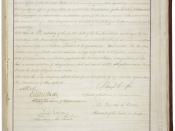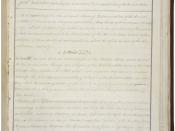ESSAY Can't find it here? Try MegaEssays.com Fifth Amendment: Double Jeopardy By: Rita Double jeopardy is the prosecution of a person for an offense for which he or she has already been prosecuted. The double jeopardy clause, which is in the Fifth Amendment of the United States Constitution, was designed to protect an individual from being subject to trials and possible convictions more then once for an alleged offense. The idea was not to give the State too much over the individual, this way no individual will be subject to embarrassment, expense, and ordeal against being tried for an alleged offense more then once. It also reduces the possibility of someone innocent being found guilty.
The double jeopardy clause of the Fifth Amendment embodies three protections to criminal defendants; (1) it protects against second punishment for the same offense after acquittal, (2) it protects against second punishment for the same offense after conviction, and (3) it protects against multiple punishments for the same offense.
The clause not only protects the integrity of final judgment, but it protects the accused against the strain and burden of multiple trials, which would also enhance the ability of government convictions. There have been many cases involving double jeopardy in the United States. The three cases I will be highlighting are Green v. United States, 355 U.S. 184 (1957), Crist v. Bretz, 437 U.S. 28 (1978), and United States v. DiFrancesco, 449 U.S. 117 (1980). In the Green v. United States (1957) case, Everett Green was indicted by a District of Columbia grand jury in two counts. The first count was that he had committed arson by maliciously setting fire to a house. The second count accused him of causing the death of a woman by the alleged arson. Green entered a plea of...


